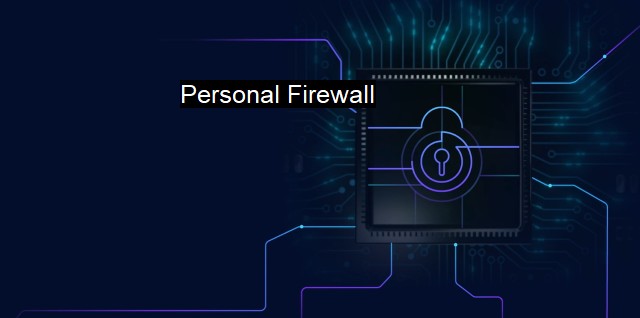What is Personal Firewall?
Exploring the Benefits of Personal Firewalls: An Essential Tool for Cybersecurity Protection alongside Antivirus Programs
A personal firewall, in context of cybersecurity and antivirus, is a software application designed to regulate the data flowing into and out the user’s computer or a network of computers and block unauthorized access while simultaneously permitting authorized communications. The concept of a firewall as a means of security is crucial in the digitized world we inhabit today with cyberspace being filled with potent threats such as malicious software, spyware, hacking attempts, phishing attacks, and unsolicited traffic which can be detrimental for the user's system or network, leading to severe data theft, data manipulation or network paralysis.The primary objective of a personal firewall is to provide an advanced layer of security that observes, controls, and alerts upon any suspicious activities attempting to manipulate the standards of regular data communication through the user’s system or a network of computers. A firewall introduces a robust barrier between the protected internal network and various foreign networks, primarily internet, based on certain sets of rules established to moderate traffic flow.
From a technical perspective, a firewall can be classified into two types: Network Firewall and Host-Based Firewall. A Network Firewall tends to protect an expanded network of computers interconnected through various nodes, whereas a Host-Based Firewall, often suggested as a personal firewall, safeguards a single host or a computer.
A personal firewall generally operates on set protocols defined to control data packets moving out and incoming into the system. This software application screens each packet to ascertain whether it should be permitted through or not depending upon the rules preset and revisable by the user.
The significance of using a personal firewall is increasingly emphatic because of the rapidly advancing technological innovations coupled with increasing cybersecurity threats, sophistication of hacking methods, phishing attacks, or Trojan threats. While an active antivirus solution can cater to counter virus-centric problems or specific malicious software, the safeguarding of the entire data flow rendered through the user's computer requires a uniquely capable medium; something which a personal firewall proficiently performs.
A personal firewall embodies multiple security algorithms along with inspecting the application data for any malware and managing the incoming and outgoing traffic, it also shields applications from executing harmful operations, blocks inappropriate URLs, and screens e-mails to capture spam or malicious content. modern firewall solution embodiments are programmed to deploy protocol anomaly protection, which disables any activities deviating from the standard patterns.
While cybersecurity continues to evolve in dealing with the threats stimulated by dissected breaches and emergent technologies, personal firewalls are also consistently updating with more advanced features. Some now offer integrated cyber threat intelligence that systematically collects, analyzes, and provides information on new and current threats. This adapted intelligence can counter threats from a more updated perspective and offers an inclusive take on modern firewalls.
Personal firewalls are an indispensable tool within our cybersecurity protocols. As invaluable as lock and keys are to the physical world, personal firewalls are to cyberspace. They promise secure communication over networks, protect against unauthorized access, shield from malicious software, and provide efficient system management. The judicious utilization of a personal firewall, along with other cybersecurity and antivirus tools, would ensure a more comprehensive safety front, encapsulating all risks and maneuvering them for the user's digital safety.

Personal Firewall FAQs
What is a personal firewall?
A personal firewall is a software program that helps protect your computer and personal information from unauthorized access by controlling the traffic that goes in and out of your system. It acts as a barrier between your computer and the internet, and it allows you to control which applications can access the internet and which cannot.How does a personal firewall work?
A personal firewall works by monitoring the traffic that goes in and out of your computer. It analyzes the data packets and determines whether they are safe or potentially harmful. If it detects an incoming or outgoing packet that is not authorized, it blocks it and alerts you. Personal firewalls can be configured to allow or block specific applications, ports or IP addresses.Do I need a personal firewall if I have antivirus software?
Yes, you do. Antivirus software and personal firewalls serve different purposes. Antivirus software is designed to detect and remove malicious software from your computer, while a personal firewall is designed to prevent unauthorized access to your computer and personal data. It is recommended to have both antivirus and personal firewall software installed on your computer for maximum protection.Can I rely on the built-in Windows firewall or do I need a third-party personal firewall?
The built-in Windows firewall is a good start, but it may not provide enough protection against all types of threats. Third-party personal firewall software offers more features and options for customization. It can be configured to block specific applications, monitor network traffic, and detect more advanced threats. It is recommended to use a third-party personal firewall software to enhance your cybersecurity protection.| | A | | | B | | | C | | | D | | | E | | | F | | | G | | | H | | | I | | | J | | | K | | | L | | | M | |
| | N | | | O | | | P | | | Q | | | R | | | S | | | T | | | U | | | V | | | W | | | X | | | Y | | | Z | |
| | 1 | | | 2 | | | 3 | | | 4 | | | 7 | | | 8 | | |||||||